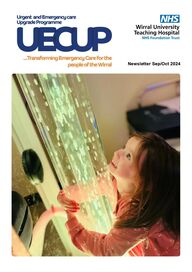
Return to flip book view
Message Newsletter Sep/Oct 2024
CONTENTNext Edition: Pop ups, cranes and time capsules.P3. Update: Phase 4 BeginsP4. Feature: Sensory Kit SuccessP6. Tour: Staff Floor P7. Team Spotlight: Penny Fray P8. Bulletin: Engagement Activities
Phase 4 of Arrowe Park Hospital’s urgent and emergency care upgrade has officiallybegun. This penultimate stage mainly focuses on modernising the hospital’s mental healthfacility, which will feature four consulting rooms and a low-stimulation environmentdesigned to help patients feel calm and comfortable.In addition to the facility enhancements, landscaping work has also commenced. Newpedestrian routes have been created to increase patient safety and prevent delays toambulances.Join the journey This season, we will also be launching a roadshow to inform and engage the communityabout Arrowe Park Hospital’s new urgent and emergency care plans. These pop eventswill highlight the benefits of the project. Stay tuned here for more updates at as we continue to enhance our facilities for thecommunity.A NEW PHASE BEGINSUPDATE
Arrowe Park Hospital has introduced a mobile multisensory station to its Children’sEmergency Department (ED), significantly improving the environment for young patients. The new addition features a colour-changing bubble column and fibre optic tail to create acalming environment, especially benefiting children with autism, ADHD, and other sensoryprocessing needs.“The mobile multisensory station has been a really useful addition to our department,” saidEmma Hogg, Manager of the Children’s ED and Assessment Unit. “It helps us supportchildren with neurodiversity while also providing a welcome distraction for our youngestpatients.”Thanks to The Beyond Project and a donation from the Cheshire and Wirral PartnershipNHS Foundation Trust, the ED also now has a sensory box packed with soothing tools likefidget toys, weighted lap pads, and ear defenders. These items make hospital visits lessoverwhelming for kids by reducing sensory overload from the hustle and bustle of thedepartment.“This makes the experience far less stressful for the whole family,” said Tamara Gilbert ofPositivitree, a social enterprise supporting families with children who have disabilities.To further ease the visit, the ED has introduced a long-range pager system, allowing youngpatients to step away from the busy waiting area until it’s their turn to be seen, cutting downon stress and sensory overload.Janelle Holmes, Chief Executive at Wirral University Teaching Hospital, said: “It’s importantthat the hospital environment is as comfortable as possible for young patients. Creating asupportive and calming atmosphere with equipment like this can make a big difference totheir experience.”Tim Welch, Chief Executive of the Cheshire and Wirral Partnership NHS Foundation Trust,added, “CWP’s Children Young People and Families Care Group are delighted to be partof this initiative supporting the needs of children and young people accessing support atArrowe Park Hospital.“It is a great example of the power of system partners working together, ensuring the healthand wellbeing of children and young people is at the heart of what we do”. PROJECT POINT: The modernisation of the children’s ED will be part of Phase 3,completed in 2025.A SENSORY SENSATION
STAFF FLOOR In the last edition, we showcased our sleeknew resuscitation facilities, but there’s even more to be excited about. Phase two alsobrought an all-new staff floor includingexclusive access, a kitchen, educationroom, offices and changing area. Photos Clockwise: Changing area withshowers; spacious kitchen; external view of thefirst floor; collaborative working space andeducation room.
Role Summary: As a media and communications advisorfor Wirral University Teaching Hospital, Ikeep staff, press, and the public informedand engaged about the Trust’s variousactivities.I started this year, so it’s a relatively newrole. Career in 60 Seconds or Less:I thrive on variety, which is reflected in mydiverse career path. I began my journeyas a junior lawyer, transitioned into newsjournalism and editing glossy magazines,before moving into marketing and PR. What brought you to the NHS?Last year, I was treated for stage threeskin cancer. I was so impressed by myclinical care that I wanted to givesomething back, and this seemed theperfect way to do it in a set time.Describe yourself in three words:Creative, curious, and courageous.Best advice? You are the author of your own story.Embrace every opportunity to learn, growand fill life’s pages with interesting stuff. Your values: Honesty, authenticity andgrowth. Interests:I love learning about other cultures. Iworked in the Middle East as anational tabloid editor for two years,and have travelled to more than 50countries. I also enjoy reading,painting and spending time with myrescue dog Milo, an elderly red foxLabrador. What would people be surprisedto know about you?English isn’t my first language. It’sWelsh. I’m originally from the wilds ofEryri, otherwise known asSnowdonia. PENNY FRAYTEAM SPOTLIGHT
SAVING LIVES WITH A SECONDSWABBING SESSION IN SEPTEMBERDuring Blood Cancer Awareness Month,Wirral University Teaching Hospital Truststaff once again held a swabbing event tosign people up for the stem cell register. Organised with DKMS and buildingcontractors Tilbury Douglas, the event atArrowe Park Hospital encouraged staff,patients, and visitors to swab their cheeks tofind potential matches for blood cancerpatients. The event underscored the life-savingimpact of joining the register, with around2,000 people in the UK currently seeking amatch.BULLETIN BOARDHEALTH MILESTONE UNVEILED ATWIRRAL FORUM At September’s Wirral HealthWatch BRIDGEForum, we presented our project’s progress tothe community. The forum, a hub for health and social carecollaboration, provided a platform to share ourachievements and plans. Engaging with local stakeholders, wehighlighted the positive impact of ourinitiatives, fostering a shared purpose toenhance emergency care in Wirral. WUTH’s Deputy chief nurse Julie Roy with volunteers from Tilbury Douglas